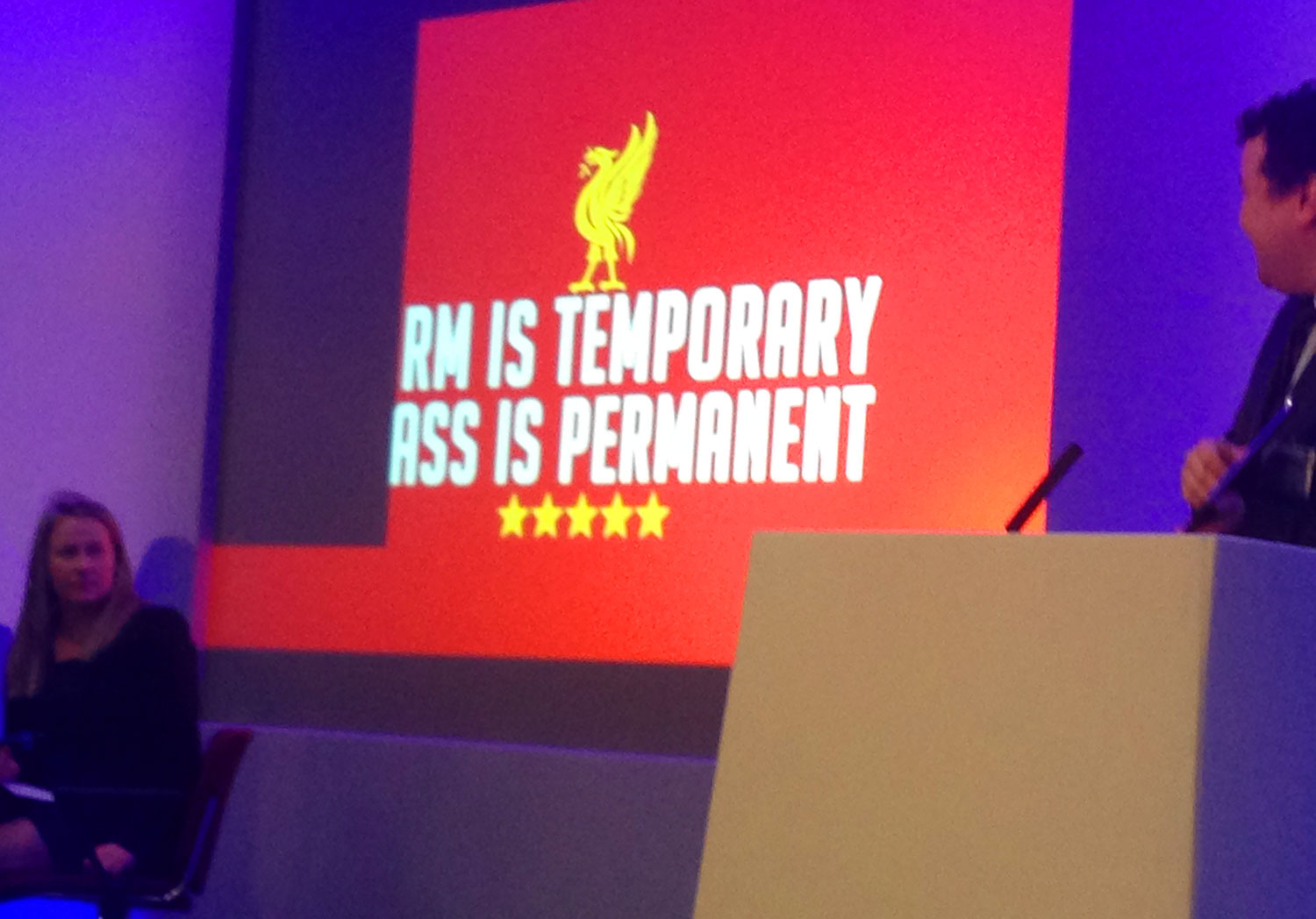Original URL: https://www.theregister.com/2014/04/11/innovation_creates_instability_blasphemer_kill_the_heretic/
Innovation creates instability, you say? BLASPHEMY, you SCUM
Ooh, a stoning, a stoning!
Posted in Bootnotes, 11th April 2014 12:33 GMT
Something for the Weekend, Sir? “Mobbafer.” I’m sorry? “Mobbafer.” I didn’t quite catch that. “Mobbafer.” So, ah, you mean, hmm… mob-ba-fer? “Mobbafer! Mobbafer!”
When dealing with people who have impenetrable accents – and by that I mean any accent different from my own – I don’t get angry, I get embarrassed. As the interlocutor tries harder to be understood, my usual lazy enunciation develops into a full-blown stereotype of pukka English with more than a hint of self-effacing fluster. In other words, I start talking like a kind of camp David Niven.
While this might work while talking to a difficult traffic cop in the States, it does not seem to be achieving any progress with the African trying to communicate with me in the middle of a cold and dark field at 5.45am on a miserable Sunday morning oppressed with low clouds and constant drizzle.
I lost my virginity in that field.
Not with the nice African and not that kind of virginity, thank you very much. Come on, there can only be one reason why a suburbanite like me would drive out to a farmer’s field at that hour on a Sunday: I was selling old toys that my kids no longer want.
To wit: I am no longer a car boot sale virgin.
My wife accompanied me that morning. She happens to be a professional and highly qualified interpreter so she had no problem extracting the true meaning of “mobbafer”. Without even looking up as she arranged pieces of Hot Wheels track and broken Power Rangers on our rickety wallpapering table, she called out to me with a tired voice that the man addressing me was quite clearly saying “mobile phone”.
Yes I have a mobile phone, thank you, I told him, speaking patronisingly slowly as my David Niven impression sounded weedy and incongruous in the dismal outdoor air. For some reason that I still struggle to understand in hindsight, I also felt compelled to prove the truth of my claim by showing him my handset and demonstrating that it was switched on, remembering too late that my desktop image is a photo of a kitten.
“Ho' mu’?”
Oh I see. You were hoping that I’d be selling mobile phones in the car boot sale and wanted to get in an early bid. I must admit to being frightfully amazed that someone would put trust in a car boot seller to supply electronic goods. Well, my good man, I’m afraid my phone is not for…
Long before I have finished this speech, during which David Niven’s beautifully flat vowels have regressed into nasal squeaks, the trader has lost patience and wandered off to strike up similar sparkling conversations with others setting up their adjacent stalls. The gentle refrain “mobbafer mobbafer” can be heard from time to time, gradually echoing more faintly as he ambles into the mist.
I experienced similar difficulty this week during technical sessions at the London Book Fair, since the most experienced and most qualified people working in IT businesses targeting the publishing industry appear to be from everywhere in the world except Britain. For an accent dullard like me, it’s a bit of a challenge making sense of what the smart guys are talking about. So let me guide you through the basics.
“Ashteemel” – this apparently is what Johnny Foreigner calls HTML.
“Perspiring” – to my great relief, this turns out to mean prospering.
“Innowation” – OK, you get the idea.
In one particular session labelled ‘Publishing & the IT Sector’, a great deal more than this was being lost in translation. We heard that 85% of jobs in the publishing industry will soon demand ICT skills but only 25% of those currently in it have any. Of course, you can make percentages mean anything you like but I’m 50% sure this is correct.
To tackle the gap in skills, the European Union is funding a project called TISP – Technology and Innovation for Smart Publishing – which encourages European tech companies and book publishers to get together to produce clever multimedia-rich customer-facing stuff and slick content management and distribution backroom stuff.
The session then became a showcase of IT companies as delivered by their European heads. A Frenchman, an Italian and a Lithuanian walk up to the mic. Is this some kind of joke, I thought. Heh.
When IT bosses talk up the power of computing, you have to take it with a fistful of salt. One of the presenters, Marcello Vena of RCS Libri, forced us to sit though three cheesy promo videos one after the other that portrayed a fantasy near-future in which high-speed-train passengers will be able to pull e-reader devices out from their armrests and download a book to read for the journey.
Do me a favour. The last time I took a long journey on a train there was no Wi-Fi, the tables were dirty, the door at the end of the carriage wouldn’t close and part of the train journey was completed by bus. That’s what you get in First Class with First Great Western, so you can easily imagine the nightmare for those in steerage. I’d love to see the greasy state of a knackered e-reader hanging off its loosened hinges as it falls out of a broken armrest in the glorious near-future of Italian railways.
Ass is permanent
Inevitably, when an IT boss sings the praises of technology in front of a large audience, the computers dig their heels in. One of the other presenters (let’s be charitable and not say which) was in the middle of bigging up the potential of his tablet device solution when his presentation, being driven from the tablet device in his very hands, decided to stop working. Better still, the screen failed to refresh completely before the wireless link crashed, turning what ought to have been the wise motto “Form is temporary, Class is permanent” into the following less familiar but no less inspiring observation:

Rounding off the session was EU policy officer Marisa Fernandez Esteban who claimed that we had apparently witnessed examples of the TISP ideal.
AWOOOOGAAA! My internal warning system kicked in at this point. It seems that while TISP is laudable in principle, it is disconcertingly lumbered with cool-sounding jargon such as “driving innovation” and “creating convergence” which, as El Reg's readers will know, mean nothing whatsoever. And as soon as I hear these phrases, pronounced in any accent, my surgically implanted bullshit meter triggers a klaxon.
What we had just witnessed wasn’t ideal at all. We had learnt how three sample IT companies had poured massive amounts of development effort into creating three entirely separate and incompatible publishing systems. How is this supposed to help?
After the session ended, I challenged Ms Esteban as to why the EU should be spending money on assisting thousands of like-minded IT companies to run off in thousands of different proprietary directions under the guise of “innovation” when what the publishing industry really needs is compatibility and interconnection.
Evidently she had never seen A Matter of Life and Death and my accent must have thrown her because she failed to follow my line of argument.
“Why do you say we should not innovate?” she replied with a chilling smile.
This isn’t “driving innovation”, I said, it’s driving instability. Far from “creating convergence”, you’re using EU cash to help fund a systematic programme of divergence.
Someone barged over to say that we had to clear the room immediately for some reason, ending our spat which, frankly, I had no hope of winning anyway. I was duly dragged away by the men in black and roughed up in the alley behind the exhibition centre. I am, of course, getting used to this.
Innovation is the buzzword of the moment. At best it is misused and at worst it's deliberately misleading. The very concept of innovation ought to imply betterment – a process of improving things. Instead, it has become a licence to create change for its own sake, with betterment being experienced only in the bank accounts of those doing the innovating.
Questioning the righteousness of innovators is heresy in these narrow-minded times but it pays to heed the bullshit meter. The next time someone starts bandying around the term “innovation” at your office, grab your mobbafer and call security to escort them from the premises. The last thing you need is someone cocking up your business because it sounds cool. ®
 Alistair Dabbs is a freelance technology tart, juggling IT journalism, editorial training and digital publishing. He says it takes two days for him to adjust to an unfamiliar accent, after which he will even try to integrate the peculiar inflections into his own speech. Unfortunately, his last trip to Glasgow only lasted two days so he only began to properly communicate with the taxi driver as he pulled in to the airport. This was just as well because he was travelling by train.
Alistair Dabbs is a freelance technology tart, juggling IT journalism, editorial training and digital publishing. He says it takes two days for him to adjust to an unfamiliar accent, after which he will even try to integrate the peculiar inflections into his own speech. Unfortunately, his last trip to Glasgow only lasted two days so he only began to properly communicate with the taxi driver as he pulled in to the airport. This was just as well because he was travelling by train.